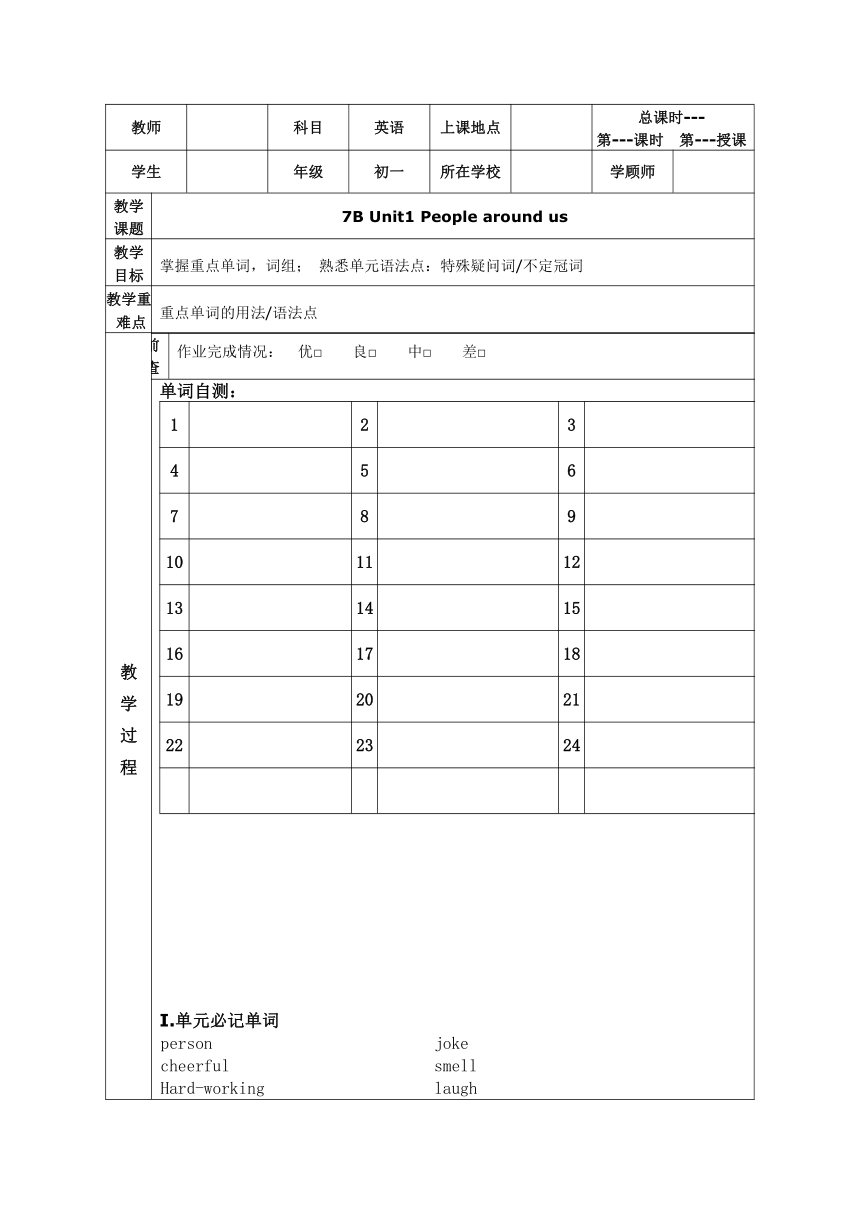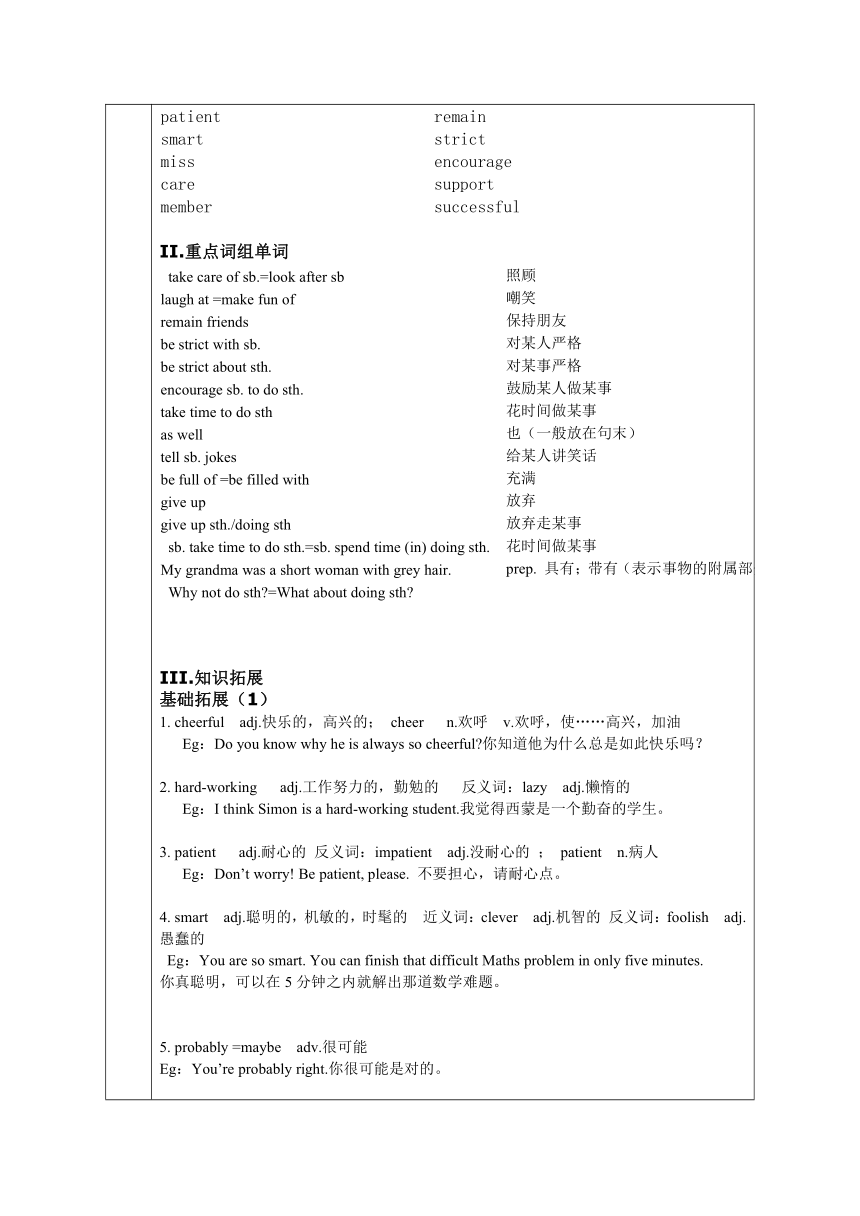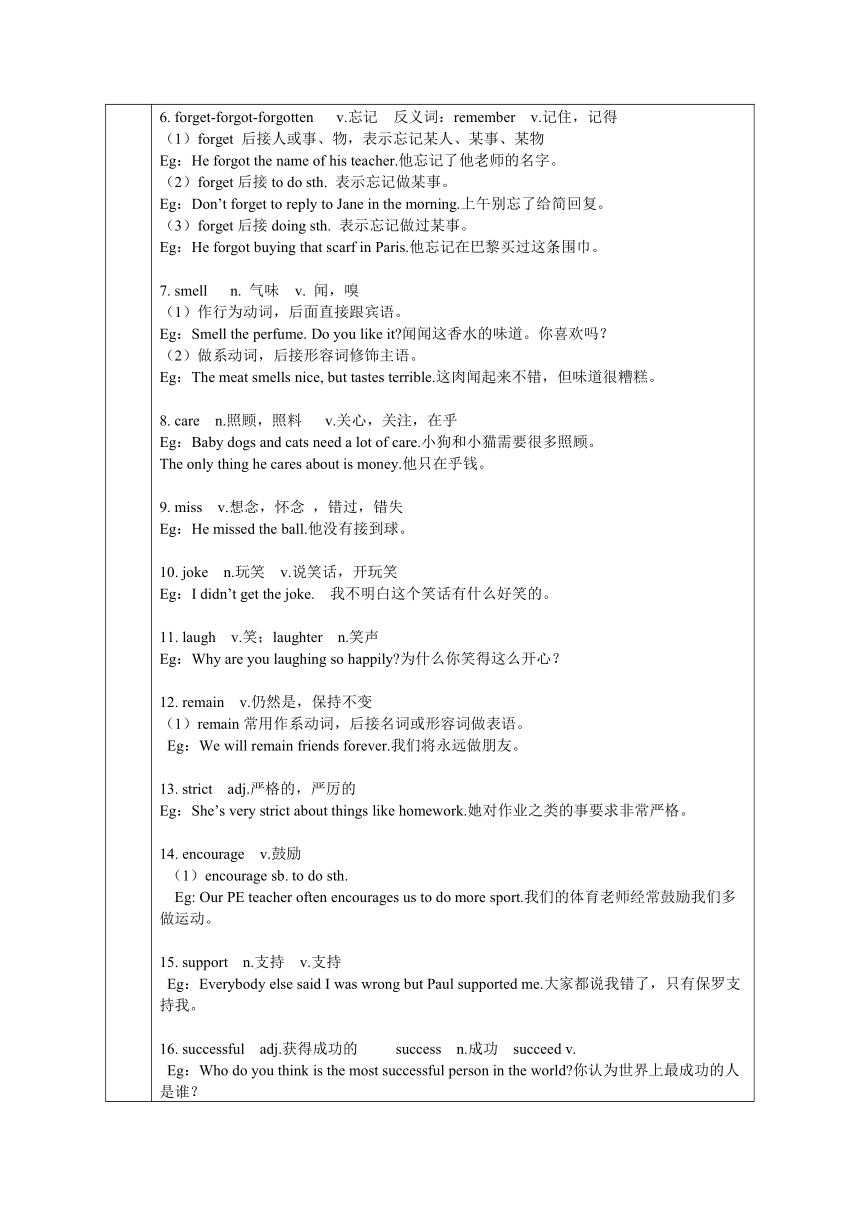Unit1 People around us基础知识讲解(教师版)
文档属性
| 名称 | Unit1 People around us基础知识讲解(教师版) |  | |
| 格式 | zip | ||
| 文件大小 | 24.9KB | ||
| 资源类型 | 教案 | ||
| 版本资源 | 牛津深圳版 | ||
| 科目 | 英语 | ||
| 更新时间 | 2022-02-10 17:33:19 | ||
图片预览



文档简介
教师 科目 英语 上课地点 总课时--- 第---课时 第---授课
学生 年级 初一 所在学校 学顾师
教学 课题 7B Unit1 People around us
教学 目标 掌握重点单词,词组; 熟悉单元语法点:特殊疑问词/不定冠词
教学重难点 重点单词的用法/语法点
教 学 过 程 课前 检查作业完成情况: 优□ 良□ 中□ 差□
单词自测: 123456789101112131415161718192021222324
I.单元必记单词 personjokecheerfulsmellHard-workinglaughpatientremainsmartstrictmissencouragecaresupportmembersuccessful
II.重点词组单词 take care of sb.=look after sb照顾laugh at =make fun of 嘲笑remain friends 保持朋友be strict with sb.对某人严格be strict about sth.对某事严格encourage sb. to do sth. 鼓励某人做某事take time to do sth 花时间做某事as well 也(一般放在句末)tell sb. jokes 给某人讲笑话be full of =be filled with 充满give up 放弃give up sth./doing sth 放弃走某事 sb. take time to do sth.=sb. spend time (in) doing sth.花时间做某事My grandma was a short woman with grey hair. prep. 具有;带有(表示事物的附属部分) Why not do sth =What about doing sth
III.知识拓展
基础拓展(1) 1. cheerful adj.快乐的,高兴的; cheer n.欢呼 v.欢呼,使……高兴,加油 Eg:Do you know why he is always so cheerful 你知道他为什么总是如此快乐吗? 2. hard-working adj.工作努力的,勤勉的 反义词:lazy adj.懒惰的 Eg:I think Simon is a hard-working student.我觉得西蒙是一个勤奋的学生。 3. patient adj.耐心的 反义词:impatient adj.没耐心的 ; patient n.病人 Eg:Don’t worry! Be patient, please. 不要担心,请耐心点。 4. smart adj.聪明的,机敏的,时髦的 近义词:clever adj.机智的 反义词:foolish adj.愚蠢的 Eg:You are so smart. You can finish that difficult Maths problem in only five minutes. 你真聪明,可以在5分钟之内就解出那道数学难题。 5. probably =maybe adv.很可能 Eg:You’re probably right.你很可能是对的。 6. forget-forgot-forgotten v.忘记 反义词:remember v.记住,记得 (1)forget 后接人或事、物,表示忘记某人、某事、某物 Eg:He forgot the name of his teacher.他忘记了他老师的名字。 (2)forget后接to do sth. 表示忘记做某事。 Eg:Don’t forget to reply to Jane in the morning.上午别忘了给简回复。 (3)forget后接doing sth. 表示忘记做过某事。 Eg:He forgot buying that scarf in Paris.他忘记在巴黎买过这条围巾。 7. smell n. 气味 v. 闻,嗅
(1)作行为动词,后面直接跟宾语。 Eg:Smell the perfume. Do you like it 闻闻这香水的味道。你喜欢吗?
(2)做系动词,后接形容词修饰主语。
Eg:The meat smells nice, but tastes terrible.这肉闻起来不错,但味道很糟糕。 8. care n.照顾,照料 v.关心,关注,在乎 Eg:Baby dogs and cats need a lot of care.小狗和小猫需要很多照顾。 The only thing he cares about is money.他只在乎钱。 9. miss v.想念,怀念 ,错过,错失 Eg:He missed the ball.他没有接到球。 10. joke n.玩笑 v.说笑话,开玩笑 Eg:I didn’t get the joke. 我不明白这个笑话有什么好笑的。 11. laugh v.笑;laughter n.笑声 Eg:Why are you laughing so happily 为什么你笑得这么开心? 12. remain v.仍然是,保持不变 (1)remain常用作系动词,后接名词或形容词做表语。 Eg:We will remain friends forever.我们将永远做朋友。 13. strict adj.严格的,严厉的 Eg:She’s very strict about things like homework.她对作业之类的事要求非常严格。 14. encourage v.鼓励 (1)encourage sb. to do sth. Eg: Our PE teacher often encourages us to do more sport.我们的体育老师经常鼓励我们多做运动。 15. support n.支持 v.支持 Eg:Everybody else said I was wrong but Paul supported me.大家都说我错了,只有保罗支持我。 16. successful adj.获得成功的 success n.成功 succeed v. Eg:Who do you think is the most successful person in the world 你认为世界上最成功的人是谁? 提高拓展(2)
1、She takes time to help her child.她花时间帮助她的孩子。 (1)take time意为“花时间”,后接动词不定式。take time to do sth Eg:Take time to check your answers before you hand in your test paper, please. 交卷之前请花点时间检查你的答案。 四花费(spend, pay, cost, take)的用法: 人+spend (spent) +时间/金钱+ on sth./ (in) doing sth.
人+pay(paid) +钱+for+物 物+cost (cost) +sb. +金钱 It takes (took) sb. some time to do sth. 如:I spent 200 yuan on the bag.= I paid 200 yuan for the bag.= I bought the bag for 200 yuan (2)help sb. (to) do sth.帮助某人做某事= help sb. with sth.在某方面帮助某人 Li Ping helps me learn English. = Li Ping helps me with my English. help oneself (to) 请自便;请随便吃 with the help of= with one’s help在某人的帮助下 can’t/ couldn’t help doing sth. 忍不住……,禁不住…… 2. my grandma was a short woman with hair. with 介词 “带有” 表伴随状态、特征。后面跟名词、动名词(动词-ing) 反义词:without“没有 ” 3. She was always cheerful. 形容词的用法:形容词修饰名词,放在名词的前面; 修饰be动词、系动词(get, become, appear等)构成系表结构 放在be动词的后面;修饰感官动词(look,smell,taste, sound, feel)放在感官动词的后面 a good cook look beautiful 4.I will never forget the taste, and the smell as well. 我将永远不会忘记那种味道和气味。 (1)as well意为“除……之外,也,还”。,和too的意思相近。 Eg:He knows English, and he knows French as well.他懂英语,还懂法语。
(2)辨析:as well,also, either as well常用于口语,多置于肯定句句末。Eg:I can swim too. also, 置于动词之前,助动词、be动词之后,常用于句中。Eg:He also wants to go. either,常用于否定句句尾。Eg:He doesn’t want to go either.他也不想去。 5、Grandma took care of my family. (1)take care of= look after= care for(此外,care for还有喜欢的意思) 照顾、爱护 Eg: Nurses take care of patients in hospital.= Nurses look after patients in hospital. 护士在医院照顾病人。 (2)care about 意为“关心,介意” care for 意为“喜欢,为……操心” Eg:Einstein who cared little for money never cared about his salary. 爱恩斯坦对金钱不感兴趣,他从不在乎薪水多少。 6.She often tells jokes to make me laugh, but she never makes fun of others.她常常讲笑话,让我哈哈大笑,但她从不取笑人。 (1)tell jokes意为“讲笑话” tell sb (not) to do sth 告诉某人做(不要做)某事 Eg:Don’t tell jokes in class.上课时不要讲笑话。 (2)make sb. do sth.意为“使某人做某事”。make后直接跟动词的原形(let/have也是此用法)。 make sth + adj. “使……处于某种状态”(此用法还有 leave/keep) Eg:The teacher made the students do a lot of homework.这个老师让学生做很多的作业。 (3)make fun of意为“嘲弄,取笑”与laugh at 意思相近。 Eg:The older children always make fun of him because of his accent.= The older children always laugh at him because of his accent. 大一些的孩子常常取笑他的口音。 拓展:1、be made of 由什么制成(看得出原材料)eg:The house is made of wood. 2、be made from 由什么制成(看不出原材料)eg: Wine is made from grapes. 3、be made into 把……制成。Eg:Grapes are made into wine. 4、be made in +地方 “产于某地” 7.I hope we will always remain friends.我希望我们将永远朋友。 (1)hope v. 希望(希望自己) hope to do sth. 希望做某事。不能说:hope sb to do sth eg. I hope to be a teacher when I grow up. 长大后我想成为一名演员。 hope + that 从句
I hope (that) you’ll deal with the problem as soon as possible. 我希望你尽快解决这个问题 wish sb to do sth 希望某人做某事(希望别人)
I wish you to write a letter soon. 我希望你尽快写封信。 (2)remain friends 意为“还是朋友,保持朋友联系” Eg:You must tell me the truth, if we are to remain friends.如果我们还是朋友的话,你必须告诉我实情。 8.she is good at Maths be good at sth/doing sth =do well in sth/doing sth 擅长某事/做某事 9.His classes are always full of fun. 他的课总是充满了欢乐。 (1)be full of=be filled with意为“充满……” Eg:The bottle is full of milk.这个瓶子里装满了牛奶。 (2)fun n. 乐趣,欢乐; funny adj.好玩的,有趣的,滑稽的,古怪的 Eg:His classes are always funny.他的课总是很有趣。 have fun doing sth 做某事玩得愉快 10.He uses lots of games in his teaching. 他在教学中运用许多游戏。 (1)teaching n.教学 teach v.教 teacher n. 教师 Eg:Linda wants to go into teaching.琳达想从事教学工作。 (2) lots of = a lot of 许多 后既接可数名词复数=many 也接不可数名词=much (3) in 在此表示“在……方面” 11.Mr Li is strict about our studies, but he always encourages us and gives us support.李老师对我们的学习要求严格,但他总是鼓励我们,给我们支持。 (1)be strict about/in 对某事要求严格,后面只能接sth. Eg:Our teachers are always strict about our homework.我们老师对我们的作业要求很严格。 (2)be strict with 对某人要求严格,后面只能接人 Eg:He is very strict with his students.他对学生非常严格。 My father is always strict in behavior with me.我爸爸对我的行为举止要求很严格。 (3) encourage sb to do sth 鼓励某人做某事 (4)support n. 支持 support v. 支持 support sb to do sth 支持某人做某事 12.He often says,“Never give up and you’ll be successful.”他常常说:“永不放弃,你就会成功
(1)give up 意为“放弃,投降,认输”,可作不及物动词用。
Eg:I give up, tell me what the answer is .我认输,告诉我答案吧。
(2)give up sth 放弃某事/某物 give up doing sth 放弃做某事 Eg:In fact I’ve given up this idea.事实上我已经放弃了这个想法。 He told me to give up smoking.他建议我戒烟。 (3)Never give up!是祈使句。相当于Don’t give up forever.永不放弃。 (4)引号中的整个句子是并列句。And 前的分句用祈使句表达条件,and后的分句表达结果。常常引用if引导的条件句进行改写。本句可改写为:If you never give up, you will be successful. 练习:快一点,你就可以赶得上早班车。 Be quick, and you can get the early bus.=If you are quick, you can get the early bus
上课情况
课后 巩固
学生 年级 初一 所在学校 学顾师
教学 课题 7B Unit1 People around us
教学 目标 掌握重点单词,词组; 熟悉单元语法点:特殊疑问词/不定冠词
教学重难点 重点单词的用法/语法点
教 学 过 程 课前 检查作业完成情况: 优□ 良□ 中□ 差□
单词自测: 123456789101112131415161718192021222324
I.单元必记单词 personjokecheerfulsmellHard-workinglaughpatientremainsmartstrictmissencouragecaresupportmembersuccessful
II.重点词组单词 take care of sb.=look after sb照顾laugh at =make fun of 嘲笑remain friends 保持朋友be strict with sb.对某人严格be strict about sth.对某事严格encourage sb. to do sth. 鼓励某人做某事take time to do sth 花时间做某事as well 也(一般放在句末)tell sb. jokes 给某人讲笑话be full of =be filled with 充满give up 放弃give up sth./doing sth 放弃走某事 sb. take time to do sth.=sb. spend time (in) doing sth.花时间做某事My grandma was a short woman with grey hair. prep. 具有;带有(表示事物的附属部分) Why not do sth =What about doing sth
III.知识拓展
基础拓展(1) 1. cheerful adj.快乐的,高兴的; cheer n.欢呼 v.欢呼,使……高兴,加油 Eg:Do you know why he is always so cheerful 你知道他为什么总是如此快乐吗? 2. hard-working adj.工作努力的,勤勉的 反义词:lazy adj.懒惰的 Eg:I think Simon is a hard-working student.我觉得西蒙是一个勤奋的学生。 3. patient adj.耐心的 反义词:impatient adj.没耐心的 ; patient n.病人 Eg:Don’t worry! Be patient, please. 不要担心,请耐心点。 4. smart adj.聪明的,机敏的,时髦的 近义词:clever adj.机智的 反义词:foolish adj.愚蠢的 Eg:You are so smart. You can finish that difficult Maths problem in only five minutes. 你真聪明,可以在5分钟之内就解出那道数学难题。 5. probably =maybe adv.很可能 Eg:You’re probably right.你很可能是对的。 6. forget-forgot-forgotten v.忘记 反义词:remember v.记住,记得 (1)forget 后接人或事、物,表示忘记某人、某事、某物 Eg:He forgot the name of his teacher.他忘记了他老师的名字。 (2)forget后接to do sth. 表示忘记做某事。 Eg:Don’t forget to reply to Jane in the morning.上午别忘了给简回复。 (3)forget后接doing sth. 表示忘记做过某事。 Eg:He forgot buying that scarf in Paris.他忘记在巴黎买过这条围巾。 7. smell n. 气味 v. 闻,嗅
(1)作行为动词,后面直接跟宾语。 Eg:Smell the perfume. Do you like it 闻闻这香水的味道。你喜欢吗?
(2)做系动词,后接形容词修饰主语。
Eg:The meat smells nice, but tastes terrible.这肉闻起来不错,但味道很糟糕。 8. care n.照顾,照料 v.关心,关注,在乎 Eg:Baby dogs and cats need a lot of care.小狗和小猫需要很多照顾。 The only thing he cares about is money.他只在乎钱。 9. miss v.想念,怀念 ,错过,错失 Eg:He missed the ball.他没有接到球。 10. joke n.玩笑 v.说笑话,开玩笑 Eg:I didn’t get the joke. 我不明白这个笑话有什么好笑的。 11. laugh v.笑;laughter n.笑声 Eg:Why are you laughing so happily 为什么你笑得这么开心? 12. remain v.仍然是,保持不变 (1)remain常用作系动词,后接名词或形容词做表语。 Eg:We will remain friends forever.我们将永远做朋友。 13. strict adj.严格的,严厉的 Eg:She’s very strict about things like homework.她对作业之类的事要求非常严格。 14. encourage v.鼓励 (1)encourage sb. to do sth. Eg: Our PE teacher often encourages us to do more sport.我们的体育老师经常鼓励我们多做运动。 15. support n.支持 v.支持 Eg:Everybody else said I was wrong but Paul supported me.大家都说我错了,只有保罗支持我。 16. successful adj.获得成功的 success n.成功 succeed v. Eg:Who do you think is the most successful person in the world 你认为世界上最成功的人是谁? 提高拓展(2)
1、She takes time to help her child.她花时间帮助她的孩子。 (1)take time意为“花时间”,后接动词不定式。take time to do sth Eg:Take time to check your answers before you hand in your test paper, please. 交卷之前请花点时间检查你的答案。 四花费(spend, pay, cost, take)的用法: 人+spend (spent) +时间/金钱+ on sth./ (in) doing sth.
人+pay(paid) +钱+for+物 物+cost (cost) +sb. +金钱 It takes (took) sb. some time to do sth. 如:I spent 200 yuan on the bag.= I paid 200 yuan for the bag.= I bought the bag for 200 yuan (2)help sb. (to) do sth.帮助某人做某事= help sb. with sth.在某方面帮助某人 Li Ping helps me learn English. = Li Ping helps me with my English. help oneself (to) 请自便;请随便吃 with the help of= with one’s help在某人的帮助下 can’t/ couldn’t help doing sth. 忍不住……,禁不住…… 2. my grandma was a short woman with hair. with 介词 “带有” 表伴随状态、特征。后面跟名词、动名词(动词-ing) 反义词:without“没有 ” 3. She was always cheerful. 形容词的用法:形容词修饰名词,放在名词的前面; 修饰be动词、系动词(get, become, appear等)构成系表结构 放在be动词的后面;修饰感官动词(look,smell,taste, sound, feel)放在感官动词的后面 a good cook look beautiful 4.I will never forget the taste, and the smell as well. 我将永远不会忘记那种味道和气味。 (1)as well意为“除……之外,也,还”。,和too的意思相近。 Eg:He knows English, and he knows French as well.他懂英语,还懂法语。
(2)辨析:as well
I hope (that) you’ll deal with the problem as soon as possible. 我希望你尽快解决这个问题 wish sb to do sth 希望某人做某事(希望别人)
I wish you to write a letter soon. 我希望你尽快写封信。 (2)remain friends 意为“还是朋友,保持朋友联系” Eg:You must tell me the truth, if we are to remain friends.如果我们还是朋友的话,你必须告诉我实情。 8.she is good at Maths be good at sth/doing sth =do well in sth/doing sth 擅长某事/做某事 9.His classes are always full of fun. 他的课总是充满了欢乐。 (1)be full of=be filled with意为“充满……” Eg:The bottle is full of milk.这个瓶子里装满了牛奶。 (2)fun n. 乐趣,欢乐; funny adj.好玩的,有趣的,滑稽的,古怪的 Eg:His classes are always funny.他的课总是很有趣。 have fun doing sth 做某事玩得愉快 10.He uses lots of games in his teaching. 他在教学中运用许多游戏。 (1)teaching n.教学 teach v.教 teacher n. 教师 Eg:Linda wants to go into teaching.琳达想从事教学工作。 (2) lots of = a lot of 许多 后既接可数名词复数=many 也接不可数名词=much (3) in 在此表示“在……方面” 11.Mr Li is strict about our studies, but he always encourages us and gives us support.李老师对我们的学习要求严格,但他总是鼓励我们,给我们支持。 (1)be strict about/in 对某事要求严格,后面只能接sth. Eg:Our teachers are always strict about our homework.我们老师对我们的作业要求很严格。 (2)be strict with 对某人要求严格,后面只能接人 Eg:He is very strict with his students.他对学生非常严格。 My father is always strict in behavior with me.我爸爸对我的行为举止要求很严格。 (3) encourage sb to do sth 鼓励某人做某事 (4)support n. 支持 support v. 支持 support sb to do sth 支持某人做某事 12.He often says,“Never give up and you’ll be successful.”他常常说:“永不放弃,你就会成功
(1)give up 意为“放弃,投降,认输”,可作不及物动词用。
Eg:I give up, tell me what the answer is .我认输,告诉我答案吧。
(2)give up sth 放弃某事/某物 give up doing sth 放弃做某事 Eg:In fact I’ve given up this idea.事实上我已经放弃了这个想法。 He told me to give up smoking.他建议我戒烟。 (3)Never give up!是祈使句。相当于Don’t give up forever.永不放弃。 (4)引号中的整个句子是并列句。And 前的分句用祈使句表达条件,and后的分句表达结果。常常引用if引导的条件句进行改写。本句可改写为:If you never give up, you will be successful. 练习:快一点,你就可以赶得上早班车。 Be quick, and you can get the early bus.=If you are quick, you can get the early bus
上课情况
课后 巩固
